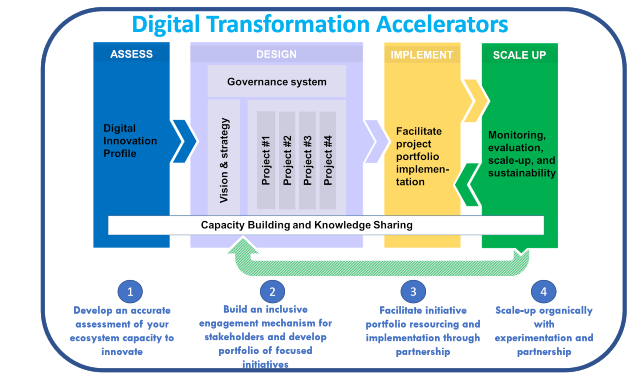Get proven blueprints for a mechanism enabling digital innovation acceleration systems at the national level.
“344 million jobs need to be created by 2030, in addition to the 190 million jobs needed to address unemployment today, and the 2 billion jobs in the informal economy."~ ILO, 2020
Interventions by digital ecosystems are often done in silos and inhibit their ultimate goals of job creation and economic growth. As a result, talent is unfulfilled, SMEs are struggling, and slow digital transformation of communities is affecting social conditions and achievement of national ambitions.
The digital innovation gap is one of the main root causes of the digital divide. Innovation is a systems issue, where stakeholders need to collaborate within and across sectors. Without this collaboration and coordination on initiatives, many ecosystems are struggling to create impact and ensure sustainability.
To achieve better outcome in key sectors, countries must accelerate digital ecosystem initiatives and improve ecosystem coordination at the national level.
Many of the traditional national innovation agencies responsible for guiding innovation dynamics or integrating innovation into key sectors remain unable to act as the coordinator of digital ecosystems. New approaches — bringing together the whole ecosystem — are needed to create meaningful initiatives, marshalling resources and expertise in a country digital ecosystem.
Digital transformation “ecosystem accelerators" are the key to accelerating digital transformation. They enable ecosystem coordination mechanisms and the development of bankable initiatives that ensure impact across sectors.
For example, with a national digital transformation acceleration center, countries can have a whole-ecosystem approach to digital transformation. This enables a mechanisms to unlock digital potential through multistakeholder and multisector collaboration focused on national development priorities.
A more focused ecosystem accelerator can also be built depending on the needs of the country. The governance model and implementation of each ecosystem accelerator depends on the country and the resources available, but the ultimate aim is the same for all:
- Develop key digital innovation systems to enhance collaboration with national stakeholders and international partners,
- Accelerate digital transformation opportunities by leveraging technological changes while organically building the innovation capacity and culture of national stakeholders, and
- Scale up the impact and sustainability of national initiatives to create lasting impact for beneficiary populations.
The result is the development of home-grown digital innovation systems that create systemic impact. Each accelerator is a strong enabler for digital transformation at the national level and can be included in the national development plan.
ITU is currently developing a
blueprint for a National Digital Transformation Acceleration Center. This blueprint is informed by the
African Digital Transformation Center project in South Africa.
